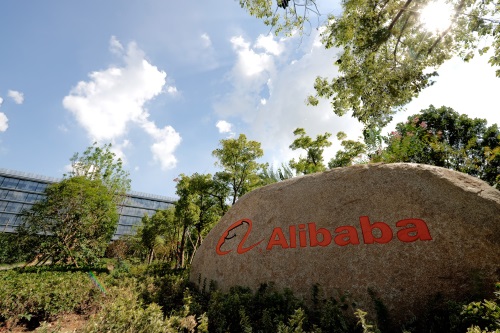
Chinese e-commerce giant Alibaba is back in court – this time over allegations of copyright infringement where fake copies of artworks have been sold on its platform.
The class action lawsuit was brought on behalf of US abstract and mixed media artist Michel Keck and claims that “substantial” numbers of bogus copies of her art were displayed and sold on the online marketplace without her permission and without paying her any royalties, and at lower prices than Keck would charge.
According to court documents, “dozens of merchants have posted hundreds of listings on the Alibaba sites displaying Keck’s artwork and offering to sell unauthorized copies of that artwork – often offering to sell buyers thousands of copies of any one painting”.
More than 70 stores and businesses are listed in the court documents as allegedly selling unauthorised copies of Keck’s artworks on Alibaba platforms. The court documents also reveal that retailers around the world have purchased unauthorised copies of Keck’s artwork from Alibaba and resold them to consumers, including an Australian store that sold more than 150 unauthorised copies of Keck’s paintings that it had obtained through AliExpress.
The lawsuit claims that Keck made repeated efforts to have the listings for her artwork removed from the Alibaba platforms. “But Alibaba failed to expeditiously remove infringing material from its sites after receiving takedown requests from Keck and has allowed merchants who repeatedly infringe her intellectual property rights to continue doing business on the Alibaba platforms,” court documents state.
The documents add that Keck has not had the promised experience that Alibaba would “fight for the little guy, the small business and their customers”, and accuses Alibaba of “substantially” facilitating and assisting the infringing activity, and alleges that the e-commerce giant financially benefits from the infringement of copyrights.
The infringing activity first came to light when Keck’s sales of artworks started to decline in late 2015 and she was notified by one of her former authorised art dealers that copies of her artwork were being sold on the AliExpress platform at prices significantly lower than what Keck charged. She later learnt that unauthorised copies were also being sold on sister platforms Alibaba.com, Taobao, and 1688.com.
The platforms were found to advertise exact replicas and derivative works with minor differences, as well as consumer products, such as cell phone covers featuring Keck’s artwork. Some stores had also added their own names and marks to Keck’s artwork, while others removed her name altogether, the court documents allege.
“The Defendant Stores, on information and belief, obtained from the internet images of Keck’s artwork, which they then reproduced and displayed on their Alibaba.com and AliExpress storefronts and printed and sold to buyers,” the court documents allege.
“Keck has lost a significant amount of business as a result of the repeated infringement of her works and has notified Alibaba that this repeated infringement has caused her serious economic harm. The availability of unauthorised copies of Keck’s artwork on Alibaba’s websites has furthermore prevented Keck from having a broader market for her work since art dealers and consumers interested in purchasing her paintings can obtain inexpensive copies of her Artwork through the Alibaba stores.”
Keck now seeks damages and declaratory and injunctive relief on behalf of herself and other copyright holders who have been harmed by Alibaba’s infringement of their copyrights.
The court case comes as public comments close for the US Trade Representative’s Notorious Markets report, which relisted Alibaba’s Taobao platform last year.
In Alibaba’s submission for this year’s report, the firm has argued it should not be included on this year’s list. “None of Alibaba’s platforms engage in or facilitate copyright piracy or trademark counterfeiting,” said Eric Pelletier, vice president, head of international government affairs, at Alibaba. “[The company] strives to be an industry leader, and a leader in China, in protecting intellectual property.”
The American Apparel & Footwear Association, a former critic of Alibaba, noted in its submission to the USTR that last year’s listing of Taobao has “directly led to improvements in online enforcement on Taobao and other Alibaba platforms” and that many of its members “have reported improvement in terms of takedown procedures and timelines”.
However, the Auto Care Association has urged the USTR to relist Alibaba as a notorious market for counterfeit auto parts. “Despite Alibaba’s efforts to address the proliferation of counterfeit products, our members report that their brand protection tools and enforcement programme have been unsatisfactory,” said Bill Hanvey, president and chief executive of the Auto Care Association. “Not only do counterfeit products threaten the US economy, and impact our members’ sales and brand value, counterfeit auto parts do not comply with any safety regulations and are a danger to the safety of consumers.”
©
SecuringIndustry.com
 | back to top
| back to top





